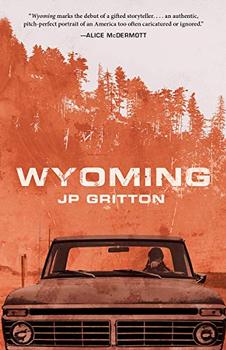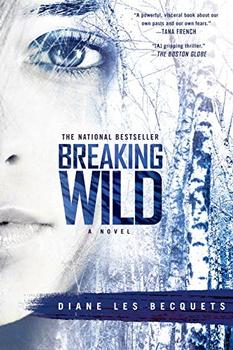Summary | Excerpt | Reviews | Beyond the book | Read-Alikes | Genres & Themes | Author Bio

Stories
by Callan WinkA Montana fly-fishing guide near Yellowstone National Park, Callan Wink has clearly impressed the literary establishment with his forthright, atmospheric storytelling. He got his start in The New Yorker, a rare honor for a newcomer. The title story was published first, followed by "Breatharians," which editor and writer Elizabeth Strout, later chose for The Best American Short Stories. Finally, "In Hindsight" was the inaugural choice for an online New Yorker novella feature.
This debut collection opens with the title story's jolting first paragraph, as Sid runs naked into the desert, "barefoot and bare-assed across the sharp sandstone rimrock far above the lights of town." He's been woken up in the middle of the night by Montana Bob, looking for the dog Sid stole from him. The stories that follow are full of young men who have made similarly bizarre, often self-destructive choices, like Terry, the protagonist of "Off the Track," who serves a two-year sentence for killing a man in a bar fight, or the narrator of "Crow Country Moses," whose stealing streak ends when he is caught trying to pawn his father's antique gun.
Perry, the antihero of "One More Last Stand," keeps making the same mistake over and over. Each year he drives into the Bighorn Mountains and dons a General Custer uniform for reenactments. Each time the act ends with Custer being killed by a Native American squaw. And each year he resumes his affair with Kat Redbird, who plays the squaw, even though they're both married to other people and Perry's wife is battling breast cancer. The title cleverly rebuts the stereotype of the "one-night stand," blending it with the legend of Custer's Last Stand.
Likewise, the double meaning behind its title is one reason why "Runoff" is my favorite story. Twenty-five-year-old Dale is dating Jeannette, a forty-something with two sons and an estranged husband. Dale, training to be an EMT, has taken up running to deal with the stress of studying for the exam. Meanwhile, the creek is rising and threatens to flood Jeannette's home, forcing them to turn to Dale's father for help with sandbagging, even though they know he disapproves of their relationship. As the story takes an unexpected turn, the narration shifts fluidly into the perspective of Dale's father, then Jeannette, then her son.
My other favorite is "Exotics," in which sixth-grade teacher James Colson drives to Texas to stay with his lawyer brother Casey for the summer while working at a hunting ranch specializing in exotic animals. Casey and his wife are expecting a baby; James is foundering after breaking his engagement and taking up with a teacher at a reservation school. Casey resents James's freedom, while James envies Casey's security and companionship. Tempted to stay on at a ranch where one might just spot a passing zebra, James feels the pull of the exotic. All the characters, it appears, are lured by the life they don't currently have.
"In Hindsight," the final novella-length story, is worth mentioning because it is the only one where the main character is female. It narrates most of the span of Lauren's life, from her young waitressing days through to retirement, as a series of good and bad luck episodes. Specifically, the narrative charts her relationship to caregiving, which seems to be her fate – occasionally dodged but often unavoidable. This story opens with a dead steer, one example of Wink's unsentimental approach to animals. Dogs, cats, and cattle feature prominently in the collection, whether alive or dead. If you're an animal lover like me, you may well struggle with "Breatharians," in which twelve-year-old August earns a dollar from his father for every barn cat he kills.
There's plenty of grim material in these nine stories, making them suitable for fans of David Vann or Cormac McCarthy. The book's most memorable image for me is a pretty darn macabre one: a vulture sits on a man's shoulder "like some hideous overgrown parrot," pecking at the shotgun hole he blew in his head. At the same time, I could appreciate the rough beauty of Wink's prose – lines like "It was a full moon, fat as a tick stuck to midnight's flank" or "Clearly it was going to be a long night, the mind chasing the heart in circles around the moon." My main stylistic complaints are that the adjective "martian" is used to describe the landscape on four different occasions, and that all but one story are in the third person — I would have preferred more variety.
A few in this collection are a bit less compelling, but the stand-outs I've highlighted more than make up for them. Wink plays around with western stereotypes in intriguing ways: "It was clear that the Indians had become cowboys or that the cowboys had all turned into Indians or that the Indians were all cowboys to begin with just nobody ever noticed." I recommend this debut to anyone who enjoys contemporary frontier tales and can handle both gritty realism and dark humor.
![]() This review
first ran in the March 2, 2016
issue of BookBrowse Recommends.
This review
first ran in the March 2, 2016
issue of BookBrowse Recommends.

If you liked Dog Run Moon, try these:

by JP Gritton
Published 2019
A cross between Daniel Woodrell and Annie Proulx, Wyoming is about the stubborn grip of inertia and whether or not it is possible to live without accepting oneself.

by Diane Les Becquets
Published 2017
In captivating prose, Diane Les Becquets tells the story of one woman missing in the Colorado wilderness and another bent on discovering the missing woman's whereabouts, in an unforgettably moving and thrilling literary debut.
These are not books, lumps of lifeless paper, but minds alive on the shelves
Click Here to find out who said this, as well as discovering other famous literary quotes!
Your guide toexceptional books
BookBrowse seeks out and recommends the best in contemporary fiction and nonfiction—books that not only engage and entertain but also deepen our understanding of ourselves and the world around us.